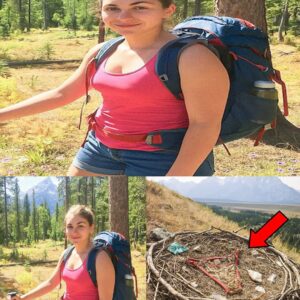The night my son told me I wasn’t welcome for Christmas, the snow in Spokane looked fake—too soft, too pretty for the words coming out of his mouth.
I sat on his expensive leather couch, the one that still carried the faint chemical smell of new money. Across from me, a twelve-foot Christmas tree reached almost to the ceiling, dripping in gold ribbon and white lights that belonged in a luxury home magazine, not in the living room of a boy I’d once taught to tape paper snowflakes to cheap blinds.
“Dad…”
Michael’s voice trembled, then flattened, like he’d practiced this in the mirror.
“You… you won’t be welcome here for Christmas.”
For a second, I thought the furnace had stopped. The warmth left my body so fast it felt like the room had dropped ten degrees. Somewhere behind the tree, a holiday movie played softly on the TV. Laughter from strangers filled the silence my son left.
I blinked. “I’m sorry, what?”
He couldn’t look at me. His eyes stayed fixed on the marble coffee table between us—the same table I’d helped him choose, the one I’d written a check for because Isabella said glass “felt cheap.”
“Isabella’s parents are coming from Portland,” he said. “They’d… prefer if you weren’t here.”
They’d prefer.
My hands went cold. Not from the draft sneaking under the French doors I’d paid to have installed, but from something far deeper.
“I see,” I said slowly. “And what do you prefer, Michael?”
He swallowed hard. His wedding ring glinted in the glow from the tree lights. “It’s just easier this way, Dad. You know how they are about traditions. They have their own way of doing things.”
Their own way.
My gaze drifted around the room. The silk curtains—my money. The refinished hardwood floors—my money. The crown molding Isabella had declared “non-negotiable”—my money. The massive flat-screen, the custom shelves, the fireplace renovation. My money. My sacrifices. My late nights bidding jobs and early mornings mixing concrete so my only son could have a life smoother than mine had ever been.
“And where,” I asked quietly, “exactly do I fit in their traditions?”
He flinched like I’d struck him.
“Dad, please don’t make this harder than it has to be.”
I laughed, but there wasn’t much humor in it. “Harder for who?”
Through the archway, I could see Isabella’s professional-grade mixer sitting on the kitchen counter, gleaming under the recessed lights. She’d insisted she needed it for a “holiday baking phase” that had lasted maybe three weeks. Two thousand dollars of my savings, used twice.
“Where am I supposed to go?” I asked. “On Christmas.”
Michael finally looked up, brown eyes full of guilt and something worse—fear. Not of me. Of losing the approval of the people who’d decided I wasn’t good enough.
“Maybe you could stay with Aunt Rosa,” he said. “Or… or we could do something the weekend after. Just us. We’ll make it up to you.”
The weekend after.
Like Christmas was an oil change he could reschedule.
My knees protested as I stood. I felt all sixty-two years in my bones and every one of the last eight since Maria died.
“I understand,” I said.
“Dad, wait—”
I walked past the gallery of family photos lining the hallway wall. In the early ones, my face took up half the frame. Proud, younger, solid. As the years passed, I shrank in the background. In the newest photo, taken at some fall pumpkin patch, you could barely see me at the edge, half turned away, one hand already disappearing out of frame.
The symbolism was not subtle.
My hand closed around the doorknob. Cold metal. Clear boundary.
Without looking back, I said, “Tell Isabella’s parents something for me.”
There was a pause. “What?”
“Feliz Navidad.”
The December air bit at my cheeks as I stepped onto the front porch. The Christmas lights around their picture-perfect entryway painted the snow in warm colors, but none of that warmth touched me.
“Dad!” Michael called once.
Then the door closed.
I stood there for a moment, looking at the house I’d helped buy, the yard I’d paid to landscape, the driveway I’d paid to resurface. The house where my name wasn’t on the deed, my photo wasn’t on the mantle, and my presence wasn’t welcome.
Then I walked to my truck.
The old Ford grumbled awake as I turned the key. I sat there with my hands on the steering wheel, watching snow melt on the windshield and slide down like the world was quietly crying for me.
My phone buzzed in my pocket.
Michael.
I let it ring.
I backed down the driveway and pulled onto the quiet Spokane street, lined with houses glowing cozy and bright. Through windows, I saw silhouettes moving around tables, children dancing in pajamas, couples hanging stockings. The American holiday picture—commercials brought to life.
Once upon a time, that had been us.
Maria and I in our small, drafty home. Cheap string lights, mismatched ornaments, the turkey that always came out a little too dry but tasted like everything good in the world because we ate it together.
She’d been gone eight years now.
And somehow, in the empty space where she once stood, someone else had moved in and pushed me, little by little, to the edges of my own family.
At the red light on 29th and Grand, I watched a young dad load shiny wrapped presents into his SUV. His kids pressed their faces to the window, breath fogging the glass, fingers tapping a silent dance of pure excitement.
My chest tightened.
I remembered a different car, an old minivan on its last legs, me wrestling a too-big bike into the back while Michael bounced nearby in a coat two sizes too big. Maria laughing, saying, “It’s okay, he’ll grow into it.”
He had grown. Just not in the direction I expected.
The light turned green.
I drove past the credit union on Fifth where I’d refinanced my house to help with their down payment. The loan officer had furrowed his brow at the numbers, at my age, at the risks.
“Are you sure about this, Mr. Flores?” he’d asked. “You’re putting a lot on the line for someone else’s property.”
Not someone else, I’d thought then.
My son.
I drove past the big bank on Lincoln where I’d taken out a second mortgage when Michael got laid off. Just temporary, he’d said. Just until I get back on my feet. Isabella had stood behind him during that conversation, her nails perfect, her watch worth more than my car.
“We’re family, Dad,” Michael had said.
And I had believed him.
At last, I pulled into my own driveway. The concrete was cracked and lopsided, the result of years of delayed repairs. My porch light flickered weakly as I climbed the steps.
Inside, the house greeted me with familiar quiet. The framed photo of Maria on the mantle smiled at me, warm and steady. Black hair pulled back, eyes bright, the same look she’d given me the day we signed the papers on this house. Our house. The one I had slowly turned into a piggy bank to fund someone else’s dream.
My phone rang again.
Isabella’s name flashed on the screen.
Perfect.
I answered, letting the silence stretch just a heartbeat too long before saying, “Hello.”
“Dennis.” Her voice carried that polished sweetness she used when she needed something from me. “I heard there was a little misunderstanding between you and Michael.”
“A little misunderstanding,” I repeated. I walked to the kitchen, leaning against the counter, staring at the outdated cabinets I couldn’t afford to replace.
“You know how my parents are,” she continued. “They’re very traditional. They have certain expectations for the holidays.”
“And what expectation,” I asked, “requires my absence?”
She hesitated. “They’re used to a specific atmosphere. Proper conversations, cultural topics, that kind of thing. They just want everyone to feel comfortable.”
“Let me get this straight,” I said. “They’re uncomfortable because I exist.”
“You’re taking this the wrong way,” she replied. “You know, all the loud music, the spicy food, your… stories. My parents move in different circles. They summer in the Hamptons. They talk about art, travel, current events. It’s… a different level.”
“A different level,” I murmured.
“And honestly,” she added, “we don’t want you to feel out of place either. My father graduated top of his class. My mother speaks four languages.”
I thought of my own hands. Scarred from decades of work. Hands that had lifted bricks, tiles, beams. Hands that had held my son when he was small and sick and scared.
“And what do I bring to the table, Isabella? Besides my bank transfers.”
Silence.
Then, in a voice a little too flat, she said, “Maria understood her place better.”
The world narrowed.
“What did you just say about my wife?”
“I’m just saying she knew which spaces were hers and which weren’t. She didn’t try to force herself into things that weren’t made for her.”
My fingers tightened around the phone. “Maria cooked for you every Sunday for three years when you couldn’t afford takeout. She watched your dog. She helped paint your first apartment.”
“Yes, and we were very grateful,” she said quickly. “But my parents—”
I didn’t let her finish.
“This conversation is over,” I said quietly. “We’re done pretending to be family.”
“You can’t just—”
“We’re done.”
I hung up before she could wrap her entitlement in another coat of fake kindness.
For a moment, I stood in the middle of my kitchen, listening to the ticking clock on the wall. The house felt different. Smaller, but somehow more solid, as though the walls themselves approved.
Then I walked to my desk.
There, in a drawer I’d avoided opening for months, sat the manila folder.
Bank statements. Mortgage documents. Autopay confirmations. Five years of financial bleeding laid out in neat rows and columns, each line quietly erasing my future.
I sat down, pulled out my calculator, and started adding.
Year one: $33,600.
Year two: $33,600.
By year three, I’d stopped buying myself new clothes.
Year four: another $33,600.
By then, I’d started choosing the cheapest brands at the grocery store, telling myself it was “heart healthy” to eat less.
Year five: almost complete. Another $33,600, plus the utilities I covered when the “budget got tight” and the surprise repairs that somehow never lined up with their weekend getaways.
My thumb hovered over the equal sign.
$168,000 in mortgage payments alone.
Add the down payment from my home equity loan. Add the kitchen renovation. The new roof. The landscaping.
More than two hundred thousand dollars.
More than I had ever spent on myself, Maria, and our entire life together.
That was the number behind Michael’s sentence: “You won’t be welcome for Christmas.”
My chest felt tight, but not from fear.
From clarity.
I picked up the phone and dialed my bank.
“Customer service,” a bright voice answered. “How can I help you today, Mr. Flores?”
“I’d like to cancel an automatic transfer,” I said. “Effective immediately.”
She pulled up the information. “I see a recurring transfer of $2,800 on the 15th of each month to Wells Fargo, account ending in 7423. Is that the one?”
“That’s the one.”
“How long have you been making this transfer?” she asked.
“Five years.”
Her fingers clicked on the keyboard. “All right. I can cancel that for you now. Are you sure you want it to stop before the next scheduled payment?”
I looked around my worn kitchen. The old stove. The scratched counter. The flickering light.
“Yes,” I said. “I’m sure.”
“It’s done,” she replied. “Is there anything else I can help you with?”
“No,” I said, and was surprised by how good that word felt. “That’s everything.”
After I hung up, I gathered all the printed statements, the receipts, the records of my quiet generosity. I carried them to the fireplace, struck a match, and watched the edges curl black.
The flames reflected in the glass over Maria’s photo, dancing in her eyes.
“For you,” I whispered.
When the last page turned to ash, my phone buzzed.
Michael.
Then Isabella.
Then an unknown number.
I ignored them all.
That night, I poured myself a glass of the good whiskey I’d been saving “for a special occasion.” I’d been waiting for a celebration that never came.
This was close enough.
“Merry Christmas to me,” I said, raising the glass to the empty room.
For the first time in years, I meant it.
The next morning, I woke to sunlight streaming through the blinds and the quiet hum of a house that no longer had to send almost three thousand dollars out the door every month.
The freedom felt almost weightless.
At 10:47 a.m., my phone rang.
Isabella.
I answered; curiosity won.
“Dennis,” she said, tight and breathless. “I need you to pick up my parents from Spokane airport. Their flight lands at two. Alaska Air, Flight 447. Baggage claim three.”
“You need me to pick them up,” I repeated.
“Yes. You’re the only one with time. We’re still getting the house ready. My dad has a bad knee. My mom shouldn’t be standing in the cold. You have the truck. It’s what family does.”
“Is that what family does?” I asked.
She sighed, annoyed. “You’re not my rival, Dennis. You’re… older. You don’t understand how these things work. Just go get them, please. In something decent. Maybe that blue shirt you wore to Michael’s graduation. They notice details.”
Details.
Not sacrifices.
“Of course,” I said. “I’ll take care of everything.”
When the call ended, I poured another cup of coffee and sat at the kitchen table, finishing the crossword in the local paper. I spent fifteen minutes stuck on one clue:
“Delayed consequence. Twelve letters.”
I left it blank.
By two o’clock, instead of pulling into the arrivals lane at Spokane International Airport, I was settling into my old armchair with a fresh cup of tea and the sports section.
My phone started buzzing.
Isabella.
Unknown number.
Isabella again.
I ignored them all and turned the page.
At 3:15 p.m., a text preview flashed on the screen:
Dad, where are you? My parents—
I put the phone face down and made myself a grilled cheese sandwich and tomato soup, eating slowly, savoring every warm bite. Outside, a neighbor’s children were building a crooked snowman, their laughter carrying faintly through the thin winter air.
By 5:00 p.m., after what must have been dozens of calls, they changed their strategy.
The pounding on my front door shook the frame.
I opened it to find Cody Jenkins, red-faced, jaw clenched so tight a vein stood out in his forehead. Catherine hovered behind him, makeup smudged, her perfect hair windblown and frizzy. Isabella stood on the porch, eyes blazing.
“What is wrong with you?” Cody exploded, marching into my living room without being invited. “We waited at that airport for over three hours!”
“You must be exhausted,” I said mildly, closing the door behind them.
“This is unacceptable,” Catherine added, her voice sharp as broken glass. “At our age, being stranded like that—”
“In fifty-degree weather with indoor heating and multiple taxi companies?” I asked.
“Do not mock us,” she snapped.
Isabella’s voice shook. “You made us look ridiculous, Dennis. My parents had to take a taxi. They had to wait in baggage claim like… like everyone else.”
“Imagine that,” I said. “Your parents standing where ordinary people stand.”
Cody jabbed a finger at my chest. “You’ve gone too far. You think you can treat people like us this way and just walk away? I have connections in this city. You’ll regret this, old man.”
I held his gaze, my voice calm. “For years, you’ve treated me like hired help while spending money I earned. For years, you’ve let your daughter and son-in-law rely on my bank account instead of their own. You used me. And when I stopped cooperating, you banned me from my own son’s Christmas.”
“That’s not what happened,” Isabella shot back. “You’re twisting things.”
“You told me your parents didn’t want me near their table because my food, my conversation, my background didn’t fit their standards,” I said. “You brought standards. I brought cash. Seems like we’re finally even.”
Catherine straightened, smoothing her coat. “You’ll be sorry. Actions have consequences.”
“You’re right,” I agreed. “They do. Goodbye.”
I opened the door.
For a moment, none of them moved. They weren’t used to doors opening for them to leave.
Then Cody shouldered past me, turning long enough to spit out, “This isn’t over.”
“I know,” I said softly. “That’s the point.”
Three days later, I found myself staring at my own face in the Spokane Review.
The headline screamed:
SPOKANE BUSINESSMAN ABANDONS ELDERLY COUPLE AT AIRPORT DURING HOLIDAY WEATHER WARNING
I read the article twice. Then a third time, slowly, tasting every lie.
According to the reporter, Cody and Catherine had been “stranded in dangerous conditions” by a “family member in declining mental health.” They were “forced” to pay a “hefty taxi fare” because I, “without explanation,” never showed.
There was no mention of five years of mortgage payments. No mention of the Christmas ban. No mention of Isabella’s call.
It was a story crafted to wound.
And it was good.
I sat back in my chair, folded the paper neatly, and placed it on the table.
For a few minutes, I let myself feel it all—the anger, the hurt, the tightness in my chest that told me I had spent too long being quiet, too long swallowing things that should have been said out loud.
Then I opened my laptop.
If they wanted the public involved, I would oblige.
By Christmas Eve morning, my dining table looked like a crime board. Bank statements highlighted in yellow. Copies of receipts. Photos printed from their social media accounts, each one stamped with dates and captions: the kitchen I paid for, the vacation I indirectly funded, the jewelry bought during months they “could barely make the mortgage.”
I sorted the documents into twelve identical stacks.
One for each person Isabella had proudly noted on her Facebook event as “Christmas dinner guest.”
I dressed for the evening like I was going to court. Navy suit. Polished shoes. One of the ties Maria had given me years ago, burgundy with a small pattern she’d said made me look “distinguished.”
At 6:30 p.m., I parked across the street from their house in Kendall Yards, watching the golden lights shine through their big front windows. Cars lined the street. Laughter drifted faintly through the glass.
To any passerby, it was the perfect picture of an American Christmas: a prosperous home, guests in nice coats, the glow of a life well-lived.
I stepped out of my truck and walked up the driveway with my briefcase.
Inside, the house smelled like rosemary, roasting meat, and expensive candles. I followed the sounds of voices to the dining room.
Isabella stood at the head of the table, mid-laugh, wine glass in hand.
Her smile died when she saw me.
“Dennis,” she said tightly. “This is not a good time.”
“Actually,” I replied, setting my briefcase on the buffet, “it’s the perfect time.”
Twelve faces turned toward me. Some I recognized from charity event photos. Others were strangers. All of them watched with the alert curiosity of people sensing drama.
I opened the briefcase, pulled out the first stack of documents, and set it in front of the nearest guest.
“Merry Christmas,” I said. “This is my gift to you.”
“What is this?” the woman asked, flipping through the pages.
“Bank statements,” I replied. “Five years of mortgage payments I made on this house. Utility bills I covered. Renovations I paid for.”
I walked around the table, placing a packet in front of each person, ignoring Isabella’s hissed, “Stop it. You’re embarrassing yourself.”
One man, dressed in a cashmere sweater, frowned at a highlighted number. “This is… every month?”
“Yes,” I said. “Two thousand eight hundred dollars. For five years.”
“Dennis volunteered to help,” Isabella said quickly. “We never asked—”
“Check the dates,” I cut in. “Then check the date of the article that ran in the Spokane Review three days ago. The one where Cody and Catherine claim I cruelly abandoned them at the airport.”
A murmur went around the table.
“You planted that?” the woman in pearls demanded, turning to Cody. “You told us some unstable relative had left you in a storm.”
“It was exaggerated,” Cody blustered. “We were under stress. The reporter—”
“The weather was clear and mild,” I said. “The only storm that day was in your pride.”
“I won’t be spoken to like this in my daughter’s home,” Cody snapped.
I nodded toward the documents in front of each guest. “That home exists because I put my own on the line.”
There was a long, fragile silence.
“Isabella,” another guest asked, brows drawn together, “is this true? He paid for all this?”
“It’s… complicated,” she said. “Dennis insisted—”
I pulled out one more sheet: a printed screenshot of her text messages rejecting me from Christmas. The part about her parents. The “atmosphere.” The “level.”
I read them out loud.
By the time I finished, no one was looking at me.
They were looking at them.
Cody. Catherine. Isabella. And Michael, who sat pale and rigid, eyes fixed on the stack of papers in front of him like it was a bomb.
“I didn’t know he was going to call the newspaper,” Michael said faintly. “I swear, Dad, I didn’t—”
“Maybe not at first,” I said gently. “But you knew enough. And you stayed quiet. That’s on you.”
Isabella’s mask cracked. “You’re trying to ruin us.”
I shook my head. “I’m just taking back my part of your story. You wanted a villain? Fine. But everyone here deserves to know who paid for tonight’s dinner. For this table. For this room.”
An older woman pushed her plate away. “I’ve known you for years, Catherine. I thought you were better than this.”
Catherine tried to speak, but the words collapsed in her throat.
I closed my briefcase.
“That’s all I came to say,” I told the room. “Enjoy your meal. It’s the last one I’ll ever be buying for this house.”
As I walked down the hallway, voices rose behind me. Questions, accusations, strained explanations. The sound of a carefully built image cracking under pressure.
Outside, the air felt cold and clean.
For the first time in a long time, so did I.
The foreclosure notice for Michael’s house arrived at my door by mistake three months later. The mail carrier mixed us up—same last name, same city, life-long habit of being entangled.
I read it once. Then again.
Three missed mortgage payments.
Fourteen days to catch up.
Or the bank would take the house I had bled for.
I made myself a cup of coffee and sat at the kitchen table, staring at the paper.
My phone had already been ringing for weeks.
Isabella, desperate.
Cody, furious.
Catherine, weeping.
I had blocked them all.
Michael’s number, though, I let ring sometimes. I’d stare at the screen, let it vibrate in my hand, then set it down.
Eventually, he stopped leaving voicemails.
That Thursday evening, he knocked on my door.
When I opened it, it took me a second to connect this worn, exhausted man to the confident son who’d once shut a door in my face.
He’d lost weight. His eyes were shadowed. The suit he wore had creases that didn’t belong to tailoring.
“Dad,” he said. “Can I come in?”
I stepped aside.
He looked around my living room as if seeing it for the first time. The new recliner. The fresh paint. The repaired light fixture. Little changes, small improvements I’d finally had the money to make.
“You’ve done a lot in here,” he said quietly.
“That’s what happens,” I answered, “when you stop paying someone else’s bills.”
He sat on the edge of the couch, hands clasped. “I owe you an apology.”
“Yes,” I said. “You do.”
“For Christmas. For listening to Isabella more than I listened to you. For letting things go as far as they did. For standing by when her parents went after you in the paper. For not being the kind of son Mom raised me to be.”
Tears filled his eyes. He blinked them away.
“I read the foreclosure notice,” I said. “The bank delivered it here.”
“We’re three months behind,” he admitted. “Isabella… she thought her parents would help. But after what happened at Christmas, they cut us off. Sponsors pulled out of their social projects. People stopped inviting them to things. They’re… not as powerful as they used to be.”
He gave a hollow laugh. “Turns out reputation matters more than they thought.”
“And now?” I asked.
“Now,” he said, “we’re losing the house. Isabella doesn’t understand. She keeps talking about how unfair it is. I keep thinking about that number. Two hundred thirty-seven thousand four hundred and sixty-eight dollars. That’s what you’d sent us. I saw the total in your notes at Christmas. I thought it was exaggerated. It wasn’t.”
“No,” I said. “It wasn’t.”
“I don’t know what to do,” he whispered. “I feel like I’m drowning.”
For a moment, neither of us spoke. The only sound was the faint hum of the refrigerator and the distant noise of a TV from a neighbor’s house.
“You swim,” I said finally. “That’s what you do.”
He swallowed. “Dad… are you going to help us?”
“No,” I said, not unkindly. “I’m not.”
He flinched like the words were physical.
“I’ve already helped,” I continued. “For five years. With money I needed for my retirement, for fixing this house, for living my own life. I helped while being treated like a burden. Like an outsider. Like a problem to be managed.”
“I was wrong,” he said. “I was so wrong.”
“Yes,” I agreed. “You were.”
He looked up at me, eyes red. “Did I lose you?”
“You didn’t lose me,” I said slowly. “You gave me away. Every time you chose them over me. Every time you let their opinions silence yours. Every time you let them talk about me like I wasn’t your father.”
He bowed his head.
“Is there any chance we can… rebuild?” he asked. “Not the house. Us.”
I thought about Maria’s photo on the mantle. About the sound of her laughing in the kitchen. About the way she’d look at Michael when he was small and say, “You protect your dad when I’m gone, okay?”
“We can,” I said. “But not on the old terms.”
He nodded, wiping his face.
“I’m not your bank,” I said. “I’m not your emergency fund. I’m not your backup plan. I’m your father. If you want a relationship, it has to be built on respect. That means when someone tries to push me out of the family, you don’t hand them the door.”
“I understand,” he whispered.
“As for the house,” I added, “you’ll figure something out. Smaller place. Different neighborhood. Less image, more reality. It won’t be the end of the world.”
“It feels like it,” he admitted.
“Sometimes,” I said, “losing the wrong things is the only way to make room for the right ones.”
He let out a shaky breath. “I’m going to move out. Isabella wants to keep fighting the bank. I want… I want to stop fighting everyone and just start over.”
I nodded. “That’s your choice.”
He stood, then hesitated. “Dad… when you stood in that dining room at Christmas and laid everything out… I was angry. Embarrassed. But… a small part of me was proud you finally stood up for yourself.”
I felt something unclench in my chest.
“Good,” I said. “Took me long enough.”
After he left, I poured myself a glass of whiskey and stepped onto the back porch. The snow was melting now, leaving patches of brown grass and small pools of water that reflected the evening light.
My phone buzzed.
A text from Rosa:
Dinner Sunday? The kids want to show you their school projects.
I smiled.
Wouldn’t miss it, I typed.
I put the phone away and looked up at the sky. The last traces of winter were fading. The air carried a hint of spring—a promise, not of perfection, but of new beginnings.
I thought about the house across town, the one I’d helped them buy.
Soon, it would belong to the bank.
For years, I’d thought that losing that house would break me. Now I knew better.
It wasn’t my loss.
I already had a home. Modest, a little worn around the edges, but finally mine again.
For the first time in a very long time, my life felt like it belonged to me.
And that, I decided, was the real Christmas miracle—arriving late, sure.
But right on time for the rest of my life.





